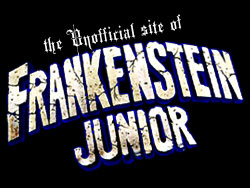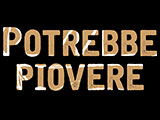Sceneggiatura
 |
Scarica: sceneggiatura originale (PDF) |
 |
Scarica: script per traduzione e adattamento (PDF) |
|
Produced by Michael Gruskoff Screenplay by Gene Wilder & Mel Brooks Frankenstein by Mary Shelley Directed by Mel Brooks "Puttin' on the Ritz" words and music by Irving Berlin |
Prodotto da Michael Gruskoff Sceneggiatura di Gene Wilder & Mel Brooks Frankenstein di Mary Shelley Diretto da Mel Brooks "Puttin' on the Ritz" testo e musica di Irving Berlin |
|
|
EXT. - FRANKENSTEIN CASTLE INT. - FRANKENSTEIN CASTLE INT. - UNIVERSITY LABORATORY Freddy: If we look at the base of a brain which has just been removed from the skull, there's very little of the midbrain that we could actually see. Yet, as I demonstrated in my lecture last week, if the under aspects of the temporal lobes are gently pulled apart, the upper portion of the stem of the brain can be seen. This so-called brainstem consists of the midbrain, a rounded protrusion called the pons, and a stalk tapering downwards called the medulla oblongata, which passes out of the skull through the foramen magnum, and becomes of course the spinal cord. Are there any questions before we proceed? Medical Student: I have one question, Dr. Frankenstein. Freddy: That's Fronkensteen. Medical Student: I beg your pardon? Freddy: My name, it's pronounced Fronkonsteen. Medical Student: But aren't you the grandson of the famous Dr. Victor Frankenstein who went into graveyards, dug up freshly buried corpses, and transformed dead components into- Freddy: Yes. Yes. Yes, we all know what he did. But I'd rather be remembered for my own small contributions to science, and not because of my accidental relationship to a famous kook. Now if you don't mind, can we get on with your question? Medical Student: Well sir, I'n not sure I understand the distinction between reflexive and voluntary nerve impulses. Freddy: Very good. Since our lab work today is a demonstration of just that distinction, why don't we proceed. Mr. Hilltop here, with whom I have never worked, nor giving any prior instruction to, has graciously offered his services for this afternoon's demonstrations. Mr. Hilltop, will you hop up on your feet and stand beside this table. Nice hopping. Mr. Hilltop, would you raise your left knee, please? You have just witnessed a voluntary nerve impulse. It begins as a stimulus from the cerebral cortex, passes through the brainstem, and to the particular muscles involved. Mr. Hilltop, you may lower your knee. Reflex movements are those which are made independently of the will, but are carried out along pathways which pass between the peripheral nervous system and the central nervous system. You filthy, rotten, yellow son-of-a-bitch. We are not aware of these impulses. Neither do we intend them to carry out our contraction of muscles, yet as you can see, they work by themselves. But what if we block the nerve impulse by simply applying local pressure? Which can be done with any ordinary metal clamp just at the swelling on the posterior nerve roots for, oh say, five or six seconds. Why you mother-grabbing bastard. As you can see, all communication is shut off. In spite of our mechanical magnificence, if it were not for this continuous stream of motor impulses, we would collapse like a bunch of broccoli. Mr. Hilltop: Oh, God. Freddy: In conclusion, it should be noted- Give him an extra dollar. Assistant: And extra dollar, yes sir. Freddy: That any more than common injury to the nerve root is always serious, because once a nerve fiber is severed, there is no way in heaven or on earth to regenerate life back into it. Are there any last questions before we leave? Medical Student: Uh, Dr. Frank- Fronkensteen? Freddy: Yes? Medical Student: Isn't it true that Darwin preserved a piece of Vermicelli unto a glass case until, by some extraordinary means, it actually began to move with voluntary motion? Freddy: Are you speaking of the worm or the spaghetti? Medical Student: Why the worm, sir. Freddy: Yes, it seems to me I did read something of that incident when I was a student. But you have to remember that a worm, with very few exceptions, is not a human being. Medical Student: But wasn't that the whole basis of your grandfather's work, sir, the reanimation of dead tissue? Freddy: My grandfather was a very sick man. Medical Student: But as a Fronkensteen, aren't you the least bit curious about it? Doesn't the bringing back to life what was once dead hold any intrigue to you? Freddy: You are talking about the nonsensical raving of a lunatic mind. Dead is Dead. Medical Student: But look at what has been done with hearts and kidneys. Freddy: Hearts and kidneys are tinker toys. I'm talking about the central nervous system. Medical Student: But sir? Freddy: I am a scientist, not a philosopher. You have more chance of reanimating this scalpel than you have of mending a broken nervous system. Medical Student: But what about your grandfather's work, sir? Freddy: My grandfather's work was doo doo. I am not interested in death. The only thing that concerns me is the preservation of life. Class is dismissed. Gerhart Falkstein: Dr. Frankenstein? Freddy: That's Fronkensteen. Gerhart Falkstein: My name is Gerhart Falkstein. I have traveled five-thousand miles to bring you the will of your great-grandfather, Baron Beaufort Von Frankenstein. |
EXT. - CASTELLO DI FRANKENSTEIN INT. - CASTELLO DI FRANKENSTEIN INT. - LABORATORIO DELL'UNIVERSITA' Freddy: Se osserviamo la base di un cervello che è stato appena prelevato da un cranio si può in effetti vedere ben poco del mesencefalo, tuttavia come ho dimostrato nella mia lezione della settimana scorsa se si distaccano delicatamente le parti inferiori dei lobi temporali si può vedere la parte superiore della radice del cervello. Questa cosiddetta base del cervello è composta dal mesencefalo, da una protuberanza tondeggiante chiamata ponte di Varolio e da un gambo che si assottiglia verso il basso chiamato midollo allungato il quale fuoriesce dal cranio attraverso il foro occipitale e naturalmente diviene il midollo spinale. Ci sono domande prima che prosegua? Studente: Io avrei una domanda Dottor Frankenstein. Freddy: Si legge Frankenstin. Studente: Come prego? Freddy: Il mio nome si pronuncia Frankenstin. Studente: Ma lei non è il nipote del famoso Freddy: Victor Frankenstein della Transilvania che andava nei cimiteri, disseppelliva i cadaveri sotterrati da poco e trasformava organi morti... Freddy: Sì, sì, sì, lo sanno tutti che cosa faceva, ma io preferisco essere ricordato per il mio piccolo contributo alla scienza e non per la mia accidentale discendenza da un famoso... coglione! Ora se non le spiace, vuol tornare alla sua domanda? Studente: Beh professore, non sono sicuro di aver capito la differenza tra impulsi nervosi riflessi e volontari. Freddy: Benone, dato che la lezione aveva in programma una dimostrazione di quella differenza possiamo procedere. Il signor Hiltopp qui presente con cui non ho mai lavorato e a cui non ho dato precedenti istruzioni ha gentilmente offerto i suoi servigi per la dimostrazione di questo pomeriggio, signor Hiltopp salti giù dal lettino e si metta in piedi lì davanti, un salto niente male, signor Hiltopp vuole alzare il ginocchio sinistro, prego, avete appena visto l'effetto di un impulso nervoso volontario, comincia con uno stimolo dalla corteccia cerebrale, passa attraverso la base del cervello ed arriva ai muscoli interessati, signor Hiltopp può abbassare il ginocchio. I movimenti riflessi sono quelli che invece non dipendono dalla volontà ma sono effettuati tramite collegamenti fra il sistema nervoso periferico e il sistema nervoso centrale. "Brutto, sporco, lurido, figlio di puttana!" Noi non siamo coscienti di questi impulsi né abbiamo la volontà che essi compiano la contrazione dei nostri muscoli, eppure, come avete visto, funzionano da soli, ma se invece noi blocchiamo questi impulsi semplicemente applicando una pressione, il che può essere fatto con una qualsiasi morsa di metallo sul rigonfiamento alla base del nervo posteriore, per diciamo 5 o 6 secondi. "Brutto bastardo, incestuoso e porco!" Come vedete ogni comunicazione è interrotta. Non basta la nostra meccanica perfetta, in mancanza di questo continuo arrivo di impulsi motori noi crolleremmo come un pezzo di stoffa bagnata. Hilltop: Oooh! Freddy: In conclusione si deve notare... Gli dia un dollaro extra. Assistente: Un altro dollaro, sì signore. Freddy: ...che qualsiasi pur anche minima lesione della radice del nervo è sempre grave, perché una volta che la fibra del nervo è recisa non vi è alcun modo in cielo oppure in terra di ricreare in essa la vita. Nessun'altra domanda prima di andar via? Studente: Ah, Freddy: Frankenstein... Frankenstin. Freddy: Sì. Studente: Non è forse esatto allora che Darwin conservò alcuni pezzi di vermicelli in una scatoletta e per chissà quale causa straordinaria essi cominciarono effettivamente a muoversi con movimenti volontari? Freddy: Sta parlando di vermi o di spaghetti? Studente: Ma di vermi professore. Freddy: Sì mi sembra di aver letto qualcosa in proposito quando ero studente, ma tenga presente che un verme, con pochissime eccezioni non è un essere umano. Studente: Ma non è stato quello alla base di tutti gli esperimenti di suo nonno, la rianimazione di tessuti inanimati? Freddy: Mio nonno vede, non era affatto sano di mente. Studente: Ma essendo un Frankenstin, lei non è neppure un po' curioso di sapere, l'idea di poter riportare in vita ciò che una volta era morto, non l'affascina? Freddy: Lei sta soltanto parlando delle deliranti sciocchezze di un individuo che era pazzo, ciò che è morto è morto. Studente: Ma pensi ai recenti trapianti di cuori e reni. Freddy: Cuori e reni sono soltanto dei giocattoli, io parlo del sistema nervoso centrale. Studente: Ma scusi allora lei... Freddy: Io sono scienziato, non un filosofo, c'è più probabilità di rianimare questo bisturi che riparare un sistema nervoso spezzato. Studente: Ma lei dimentica il lavoro di suo nonno. Freddy: Il lavoro che ha fatto mio nonno è solo cacca. La morte a me non interessa, la sola cosa che riguarda me è la conservazione della vita. Adesso la lezione è terminata. Herr Rosenthal: Dr. Frankenstein? Freddy: Sono Frankenstin. Herr Rosenthal: Mi chiama Gerhard Rosenthal ho viaggiato più di cinquemila miglia per portare il testamento di suo grande e famoso nonno, il barone Viktor Von Frankenstein. |








